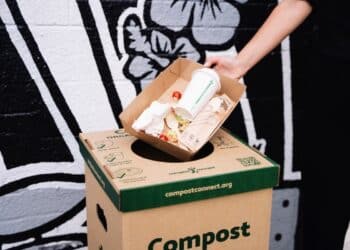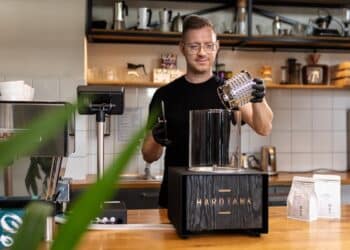In the heart of Melbourne, Mercato Centrale is redefining urban dining, partnering with Lavazza to blend artisan traditions and culinary innovation with community spirit.
Mercato Centrale is more than a market: it’s a celebration of Italian culture, cuisine, and community.
Home to 23 artisan vendors, at Mercato Centrale customers can buy warm-from-the-oven bread, shop for fresh produce, sit down for lunch or a formal dinner, or grab a shot of caffeine at any time of day or night.
When Managing Director Gary Patikkis and team embarked on bringing the iconic concept to Australia, Melbourne was their singular vision.
“We chose Melbourne because it’s the hospitality capital of Australia,” Gary says. “We thought, if there’s an opportunity to really expose and highlight Mercato Centrale, the vehicle to do that would be our first step in Melbourne.”
But the journey to establish the Italian marketplace on the other side of the world was far from simple.
“It took us eight years to get Mercato Centrale to come to Australia, the first site outside of Italy,” he says, noting its existing locations in Florence, Milan, Rome, and Torino.
This wasn’t just a business expansion but a passionate mission to transpose authentic Italian market culture. The search for the perfect location was meticulous, driven by a commitment to historical significance.
The McPherson’s building – a four-storey Art Deco structure in the heart of the city on Collins Street – emerged as the ideal venue, embodying the Italian tradition of positioning markets in structures with deep cultural value. The building’s industrial heritage became a canvas for their vision.
“The McPherson family used to manufacture nuts, bolts, and rivets, and supplied the construction of the Sydney Harbour Bridge,” says Gary.
“We designed the space with an Art Deco feel, with steel floors and rustic pillars, creating an industrial feel for a market theme concept.”
The historical connection runs deep – original building owners still visit, bringing memorabilia and sharing stories.
“We spent a lot of time with the Italians [at Mercato’s Italian locations] and were really blown away by the way they bring food, culture, and people together under one roof,” Gary says.
This philosophy became the cornerstone of Mercato Centrale’s approach. The eight-year journey wasn’t about speed but precision.
“We could have launched earlier very easily, but to get all the right artisans and every little detail right mattered,” he says.
They were determined, he says, to get every element right before launching the concept.
The result is more than a marketplace. It’s a carefully curated space that celebrates Italian culture, community, and culinary excellence – a testament to patience, passion, and a vision of bringing authentic experiences to Melbourne’s vibrant hospitality landscape.

Progressive partnerships
The partnership between Mercato Centrale and Lavazza emerged from a meticulous selection process rooted in shared values and a commitment to excellence.
“We spent a lot of time trying to understand suppliers and artisans,” Gary says. “We’re careful who we partner with. It’s not about just getting the supply right – it’s about the holistic view of the project.”
Lavazza’s new coffee range Mosaic, developed by artisans and roasted in Australia specifically for the local palate, proved to be the ideal choice.
“We decided to go with the Mosaic blends, because they are created by artisans and that’s perfectly aligned with the spirit of what we do here,” he says.
They selected two blends – Ochre, for milk-based coffees, and Tidal, for espresso – carefully chosen to suit Australian coffee preferences.
“We noticed the Ochre blend was a lot sweeter than traditional blends,” Gary says. “We blind tasted it and had a whole series of our team members try it. It was so easy to drink, it was an easy decision for us.”
This attention to detail reflects the depth of their collaborative approach. In fact, the partnership with Lavazza has transcended a typical supplier relationship.
“Lavazza spent a lot of time trying to understand the needs of customers in Australia,” Gary says, highlighting Lavazza’s commitment to understanding the local market’s unique coffee culture.
This included recognising the difference between European espresso and Australian latte preferences. He says the collaboration was intensely hands-on and supportive.
“For the first three months, they would be swinging by, looking at the shop through the eyes of the customer,” he says. “If that’s not the definition of a partnership, I don’t know what is.”
Lavazza’s involvement extended to educational initiatives, including Mercato Centrale’s masterclasses and coffee workshops, which represent a cornerstone of its community engagement strategy.
“We have 23 artisans in the market and therefore we host 23 free masterclasses every month of the year,” he says. “Customers can book into a class to learn how to make gnocchi, pizza, or explore coffee preparation techniques.”
The classes are deliberately diverse and interactive.
“We mix it up a bit,” Gary says. “We create opportunities for customers to make great coffee at home, with equipment they’ll have on hand like a cafetiere.”
The approach goes beyond simple instruction, integrating multiple artisan skills.
“We partner with other artisans like our flair bartenders, who might demonstrate coffee-based martinis, or our cannoli station, teaching customers how to pair the right product with coffee,” he says. “We want to give customers the tools to go away and make great quality coffee.”
The classes serve multiple purposes, becoming more than just cooking lessons.
“Businesses use them as bonding exercises with their colleagues,” he says. “And it’s a great way for customers to understand why and how we do things.”
Ultimately, these masterclasses embody Mercato Centrale’s collaborative spirit.
“Every artisan knows their product intimately and passionately, so customers experience the product the way it’s meant to be consumed – authentically,” Gary says.
“We work very closely with Lavazza on these classes, and Nick Ferrara and Peter Dorkota [Lavazza National Training Managers] get involved as well,”.
Ultimately, Gary sees the relationship with Lavazza as emblematic of a progressive business approach.
“Partnerships like this are the way of the future,” he says. “Companies like Lavazza that have been around for many years really add value to any customer because they educate.”
The collaboration represents more than a commercial arrangement – it’s a shared commitment to culinary excellence, community, and authentic experience.

Future thinking
Having invested eight years to establish the business in Melbourne, it shouldn’t come as a surprise to learn that sustainability is a core principle at Mercato Centrale, with Gary emphasising that environmental initiatives don’t compromise quality or increase costs.
“We’re constantly looking at ways to improve how we do things and show the hospitality sector you can operate in a sustainable way without jeopardising quality or price,” he says.
The marketplace’s Compost Connect program exemplifies this commitment.
“Every artisan boutique has a compost bin in which unused ingredients are collected, picked up, and transferred to a station where they’re used to plant trees and create manure,” Gary says.
Technological innovation also supports the team’s sustainability goals.
“We have a mobile induction kitchen, which was installed in collaboration with Electrolux. It’s first of its kind, completely powered by a lithium battery,” he says. “You plug it in, charge it, and it gives you eight hours of battery life.”
Community engagement goes hand-in-hand with their sustainability efforts.
“We engage a lot with the Melbourne City Council and various cultural organisations. We offer Mercato Centrale freely for community events, helping raise money and awareness,” Gary says.
“We don’t ask for anything in return. We just want to be a good corporate citizen.”
For more information, visit lavazzamosaic.com.au
This article appears in the June 2025 edition of BeanScene. Subscribe HERE.




